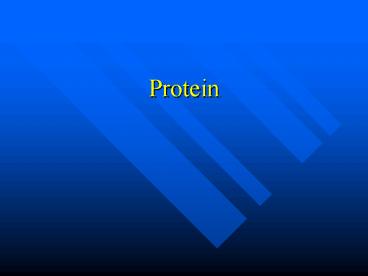Protein - PowerPoint PPT Presentation
1 / 20
Title:
Protein
Description:
9 essential- body cannot produce, must be present in the diet ... Lima beans and corn succotash) Diet recommendations for vegetarians. Choose a variety of foods. ... – PowerPoint PPT presentation
Number of Views:197
Avg rating:3.0/5.0
Title: Protein
1
Protein
2
Protein provides building material for body
tissues
- Muscles
- Enzymes
- Hormones
- Connective tissue
- Antibodies
- Red blood cells
3
Amino Acids- building blocks of protein
- Protein is broken down by enzymes and absorbed by
the body as amino acids - 20 common amino acids
- 9 essential- body cannot produce, must be present
in the diet - 11 non-essential- body can produce not necessary
in the diet - Amino acids are reassembled into proteins to form
muscles, etc.
4
Protein quality
- High quality proteins contain all essential amino
acids in amounts needed to support protein tissue
formation. - If any essential amino acids are missing, protein
synthesis cannot take place. Amino acids that ARE
present will be broken down for energy or
reassembled as fat for storage. - Essential amino acids are needed on a daily
basis.
5
Complete proteins
- Contain all 9 essential amino acids.
- Are found in animal products, such as meat, eggs
and milk. - ALL animal products are complete proteins except
for gelatin.
6
Incomplete proteins
- Deficient in one or more essential amino acids.
- Are plant proteins (soy is complete for adults
but not for children) - Eating incomplete proteins that are deficient in
different amino acids in the same meal compliment
each other and make a complete protein.
7
Vegetarian Diets
- with a little planning, diets that contain only
plant foods can provide enough protein. - Some cultures and religions call for a vegetarian
diet.
8
Amino Acid supplements
- Tryptophan supplements
- Melatonin?
- Amino acid supplements and protein powders may
have side effects. - Supplements are not necessary for athletes to
build or maintain muscles.
9
Protein in the diet
- 70 of protein in the American diet comes from
animal products. - Plant protein sources are usually lower in fat.
- Protein deficient diets
- Kwashiorkor- protein deficient
- Marasmus- protein-calorie deficient
- Both are usually accompanied by other nutrient
deficiencies
10
Vegetarianism
- For most of the worlds people, vegetarianism is
not a choice. - People who choose to be vegetarians tend to be
health conscious individuals who also avoid
alcohol, tobacco, illicit drugs, and who
participate in regular physical activity. - People may become vegetarian for health,
religious, cultural or environmental reasons or
to not harm animals.
11
Types of vegetarians
- Far vegetarians
- no red meat (fish and poultry OK)
- Quasi-vegetarians
- no red meat, may or may not include poultry
- Lacto-ovo vegetarians
- No meats, poultry, fish but include eggs and
dairy - Lactovegetarian
- Plant and dairy products only
- Macrobiotic
- Plant products and fish only
- Vegan
- Only plant products- may avoid honey and clothes
made from animal products - Fruitarian- only fruits and olive oil
12
Vegetarian diets and health
- Appropriately planned vegetarian diets are
healthful, are nutritionally adequate, and
provide health benefits in the prevention and
treatment of certain diseases. - Position of the American Dietetic Association,
1997
13
Health benefits of vegetarian diets
- Vegetarians have a lower risk of developing
- Heart disease
- Stroke
- Hypertension
- Diabetes
- Chronic bronchitis
- Gallstones
- Kidney stones
- Colon cancer
14
Complimenting proteins
- Dried beans grains complete protein
- Seeds dried beans complete protein
- Bean burrito on corn or wheat tortilla
- Peanut butter sandwich
- Red beans and rice
- Hummus and bread
- Black-eyed peas and corn
- Lima beans and corn succotash)
15
Diet recommendations for vegetarians
- Choose a variety of foods.
- Choose whole, unrefined foods often.
- Choose a variety of fruits and vegetables.
- If animal products are used, choose lower-fat
versions. - Vegans should include B12 in their diets and
Vitamin D if sun exposure is limited. - Do not restrict dietary fat in children younger
than two years.
16
Vitamin B12
- Present only in animal products
- Can obtain from B12 fortified soy milk, breakfast
cereal, or B12 supplements
17
Vitamin D
- Sun is a main source
- Dairy products are a main source
- If sunlight is limited and dairy products are not
consumed, a Vitamin D supplement is recommended. - Vitamin D is very toxic at levels 2-3 times the
RDA. Avoid over-supplementation.
18
Calcium
- Dairy products are the main source of calcium in
the diet. - Dark leafy greens and dried beans are OK sources
of calcium. - Calcium-fortified orange juice and soy milk may
be used to increase calcium intake.
19
Zinc
- Zinc is abundant in plant sources but is poorly
absorbed. - Whole grains, dried beans, fortified cereals, and
zinc supplements can be used.
20
Misinformation on vegetarian diets
- They are health-promoting
- BUT
- They cannot cure cancer.
- They cannot cure AIDS.
- They dont lead to inner peace or spiritual
renewal. - They are not magic bullets that will cure all
ills.































